computervision
Latest
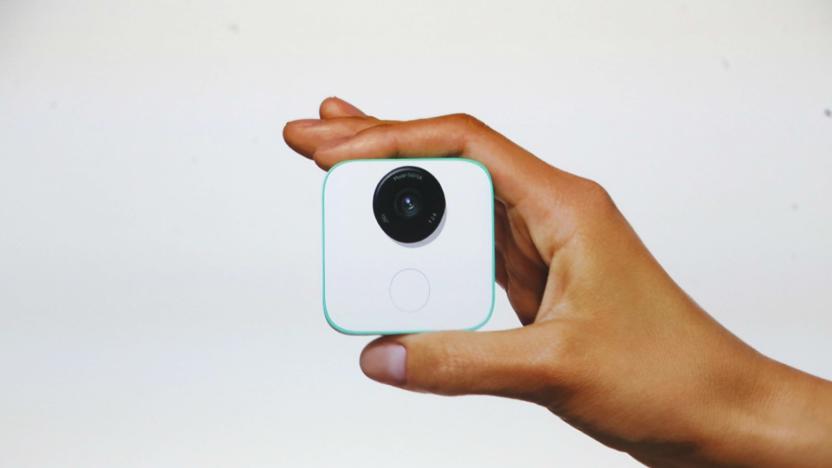
Google Clips camera lays the groundwork for our AI-powered future
Allow me to make a bold prediction: Google's Clips camera is going to flop. Clips is a $250 camera powered by artificial intelligence and designed to snap images of important moments as they happen, no human input required. At best, it'll probably sell OK at launch -- there will be a handful of cute videos showing how the camera performs while attached to a dog or the top of a baby's toy mobile, and the internet will briefly swoon. Maybe a few months later, it'll catch a crime in action, and we'll be reminded that these odd, all-observant cubes exist. But, regardless of the viral content that comes out of Clips, it's not going to be enough to convince mainstream consumers to run out and drop more than $200 on a clip-on camera. Smartphones have cameras (really good ones, even), and a lot of people have smartphones. Clips might address a real problem -- freeing up users to experience life without worrying about filming it -- but no one needs this technology right now. Besides, it's kind of a creepy concept overall. Allow me to make another, less bold claim: Google knows all of this. And while it would be great for the company's bottom line (and its data-collection department) if Clips takes off, it doesn't need the hardware to sell well right now. Google most likely has larger plans for Clips' software.

Samsung is the latest tech titan to open an AI lab in Canada
If it wasn't already clear that Canada is becoming a hotbed for AI research, it is now: Samsung has opened an AI lab (shown below) at the Université de Montréal. The school's faculty and students (including long-time Samsung partner Prof. Yoshua Bengio) will collaborate with South Korean researchers on a slew of AI-related projects, including self-driving car technology, image recognition, translation and robots. While you may not see the first fruits of this lab for years, it underscores both Samsung's increasing dependence on AI and the tech industry's rapid shift to the north.

Giphy taps Google AI tech to help you find the right GIF
Giphy's collection is a good way to find the right GIF to express your feelings... up until you're tracking down that one elusive GIF that's improperly tagged. The company has a clever solution, though: make AI technology look through the GIFs itself. It's implementing Google machine learning that combs through the animated image files looking for caption text. If you're trying to find the "where are the turtles" quote from The Office, you'll actually see GIFs related to that quote -- not every vaguely turtle-related picture under the Sun.

John Deere bought an AI company to optimize crop spraying
Want to know how pervasive AI is becoming in seemingly all facets of daily life? Just ask Deere & Company. The John Deere brand owner just acquired Blue River Technology, which uses machine learning and computer vision to target herbicide spraying at just the weed-infested portions of a farm field. The technology can minimize both waste and the amount of input needed while spraying, saving farmers headaches and money in the process.

Google's new Street View cameras help AI map the real world
Google's Street View cameras haven't changed significantly in 8 years, and that's a problem when the technology world most certainly has. How is the company supposed to fulfill its AI ambitions with 2009-era hardware? Thankfully, it won't have to. Google has revealed to Wired that it's implementing a brand new camera design that should not only produce higher quality Street View imagery, but will prove crucial to Google's use of AI to index real-world locations.

Intel’s Myriad X chip will give drones and robots better vision
It's been almost a year since Intel scooped up AI and computer vision chip-maker Movidius. By the time of its takeover, the company had already crammed its Myriad 2 processor into drones, cameras, and USB sticks -- making it a good fit for Intel's beyond-the-PC strategy. The newly-unveiled successor to that chip will continue in the same vein. Only, this next-gen beast is the first to pack a "Neural Compute Engine." What that essentially means is that it has some pretty powerful deep learning capabilities. If Intel gets its way, the Myriad X chip will help drones, smart cameras, and robots to learn from and interact with their surroundings in real-time.

Drones will watch Australian beaches for sharks with AI help
Humans aren't particularly good at spotting sharks using aerial data. At best, they'll accurately pinpoint sharks 30 percent of the time -- not very helpful for swimmers worried about stepping into the water. Australia, however, is about to get a more reliable way of spotting these undersea predators. As of September, Little Ripper drones will monitor some Australian beaches for signs of sharks, and pass along their imagery to an AI system that can identify sharks in real-time with 90 percent accuracy. Humans will still run the software (someone has to verify the results), but this highly automated system could be quick and reliable enough to save lives.

Prisma hopes to market its AI photo filtering tech
Prisma's machine learning photography app may not be as hot as it was in 2016, but that doesn't mean it's going away. If the developer has its way, you'll see its technology in many places before long. The company tells The Verge that it's shifting its focus from just its in-house app to marketing numerous computer vision tools based on its AI technology, ranging from object recognition to face mapping and detecting the foreground in an image. In theory, you'd see Prisma's clever processing find its way into your next phone or a favorite social photography app.
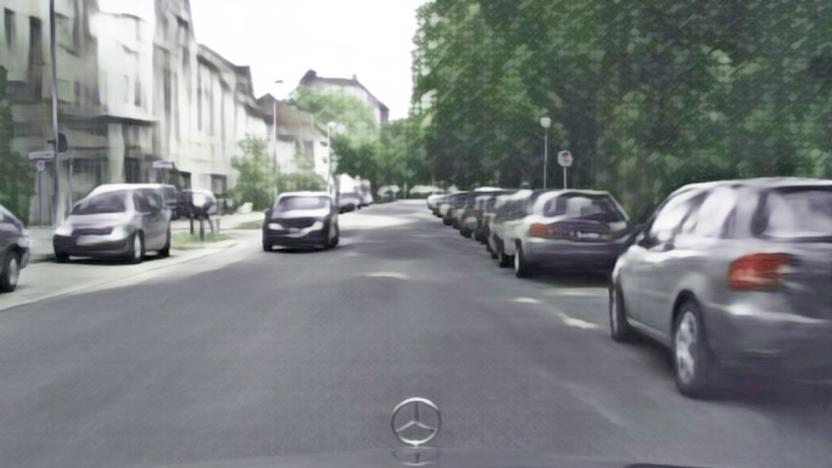
AI creates fictional scenes out of real-life photos
AI's not quite ready to build photorealistic worlds on its own. But it's getting pretty close.

Researchers use AI to monitor hospital staff hygiene
Hospital-acquired infections are a pesky problem and around one in 25 hospital patients have at least one healthcare-associated illness at any given time. To combat this issue, a research team based at Stanford University turned to depth cameras and computer vision to observe activity on hospital wards -- a system that could be used to track hygienic practices of hospital staff and visitors in order to spot behaviors that might contribute to the spread of infection. The work is being presented at the Machine Learning in Healthcare Conference later this week.

Nanit the AI nanny tries to unravel the mysteries of a restless baby
When my wife and I became parents, the most important weapon in our childcare arsenal was an A5-size notebook. In this mighty tome we wrote out every single data point relating to our new baby, from the quantity of milk she drank and duration of sleep through to the volume of excreta. It was, after all, only with this information that we were able, in our sleep-deprived and confused state, to coordinate how to meet her needs.
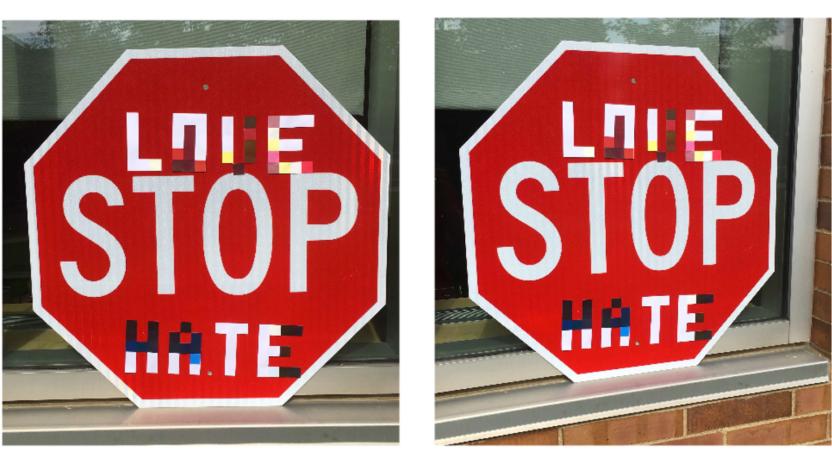
You can confuse self-driving cars by altering street signs
While car makers and regulators are mostly worried about the possibility of self-driving car hacks, University of Washington researchers are concerned about a more practical threat: defacing street signs. They've learned that it's relatively easy to throw off an autonomous vehicle's image recognition system by strategically using stickers to alter street signs. If attackers know how a car classifies the objects it sees (such as target photos of signs), they can generate stickers that can trick the car into believing a sign really means something else. For instance, the "love/hate" graphics above made a computer vision algorithm believe a stop sign was really a speed limit notice.

AI vision can determine why neighborhoods thrive
It's relatively easy to figure out whether or not a neighborhood is doing well at one moment in time. More often than not, you just have to look around. But how do you measure the progress (or deterioration) a neighborhood makes? That's where AI might help. Researchers have built a computer vision system that can determine the rate of improvement or decay in a given urban area. The team taught a machine learning system to compare 1.6 million pairs of photos (each taken several years apart) from Google Street View to look for signs of change on a pixel-by-pixel, object-by-object basis. If there are more green spaces or key building types in the newer shot, for instance, that's a sign that an area is on the up-and-up.
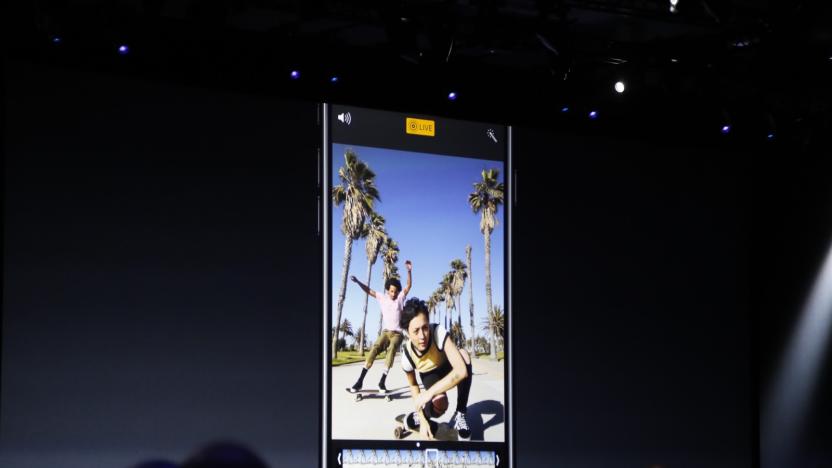
iOS 11's Photos app uses AI to make your shots better
Apple's iOS 11 promises to be a big upgrade for shutterbugs. It's improving both the Camera and Photos apps to take some of the headaches out of snapshots and photos. For instance, the Photos app's Memories section can make use of machine learning to automatically reorient images when you change your phone's orientation -- it knows what to focus on. Live Photos also make use of this AI-like technology for effects. And Live Photos should be decidedly lively with new visual tricks, including a long exposure blur effect, the ability to pick a key photo, video looping and a Boomerang-style "bounce" effect.
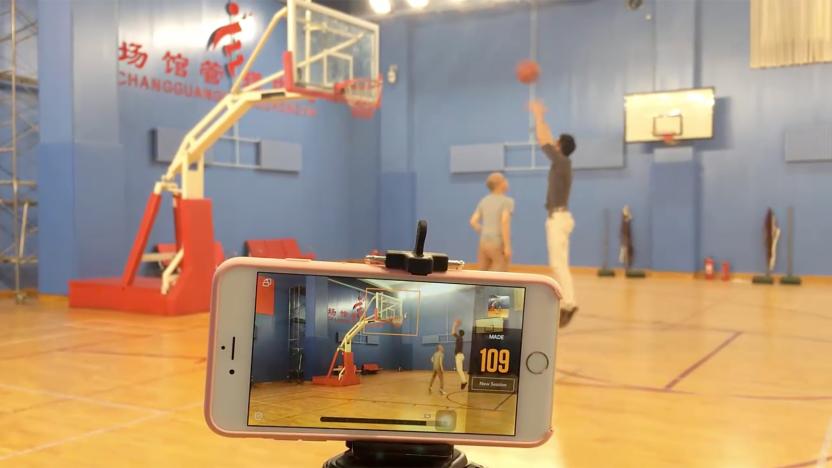
Zepp phone apps use AI to study your basketball shots
You may know Zepp for sports tracking sensors you can slap on your baseball bat or soccer ball, but its latest tracking involves little more than your phone and a good view of the action. Its game recording and training apps (Android, iOS) are adding a dash of AI technology (namely, computer vision) to analyze your baseball swings, golf swings and basketball shots. If your three-pointer throwing needs work, you just need to point your phone's camera at the court and start capturing. You can share the videos and performance data with others, too, in case you need to prove your skills to recruiters.

Google Lens offers a clear view of the company’s future
Google Lens is both a return to form for the search giant and a tantalizing glimpse into what lies ahead. Google's early claim to fame was its ability to efficiently index the web and fetch search results quickly, bringing some much-needed organization to the chaotic early days of the internet. Lens, similarly, uses computer vision and AI to make sense of your photos, videos and the real world. It's basically Google search for everything outside of screens. Most intriguingly, Lens is yet another way for Google to expand on its original mission statement: "to organize the world's information and make it universally accessible and useful."
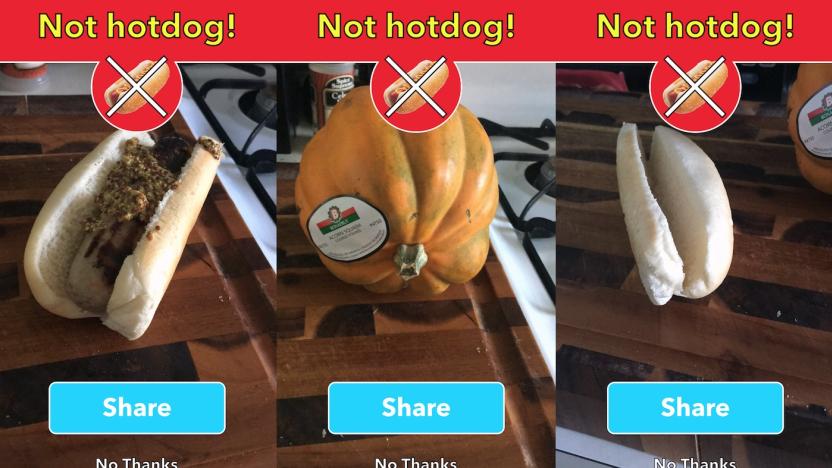
The ridiculous Not Hotdog app from 'Silicon Valley' is real
Our long national nightmare is over: Thanks to HBO and Silicon Valley there's finally an app that will tell you if the object you pointed your phone's camera at is a hot dog or not. For fans of the show, it's a cute joke, but everyone else might be a little puzzled. As a brief bit of background, T.J. Miller's character Erlich Bachman accidentally invested in an app he thought had something to do with Oculus, when, in actuality, it was an application with recipes for preparing octopus rather than anything to do with virtual reality. A common mistake, to be sure.
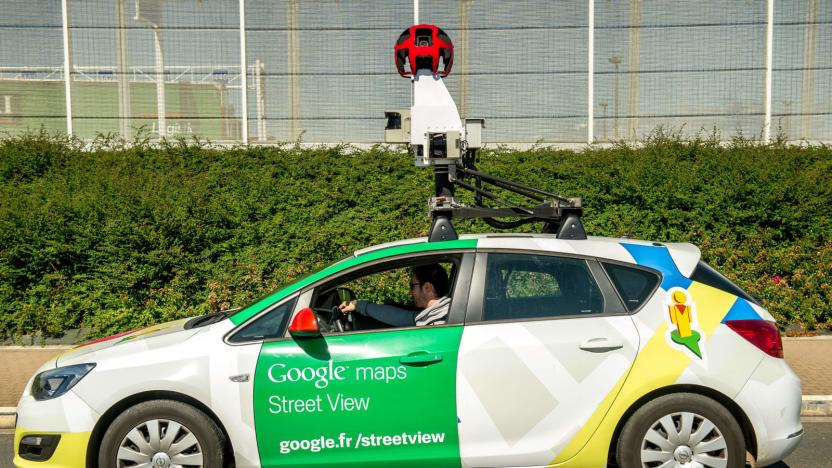
All Google needs to update business info is a Street View photo
Google is no stranger to using machine learning to improve its products -- or save manatees. To that end, the internet juggernaut has announced that its algorithms are capable of successfully pulling business names and phone numbers from Street View photos. In its tests, the technology was successful at "reading" French street signs over 84 percent of the time. Meaning, now a Street View car can roam the streets of a city and fill in a business' Google Maps profile automatically. It stems from Google's work using machine learning and computer vision to blur out faces and license plates.

Robots could soon cooperate on surveillance
Computers are getting better at spotting objects, but they tend to work in isolation. What good would a security robot be if it couldn't share info about an intruder with other machines? Cornell scientists might have an answer. They're designing a system that would let robots and other autonomous devices cooperate with each other on identifying and tracking objects. Each bot would send its imagery to a central unit that could talk to both other camera systems and the internet to help identify objects. The group would combine and compare images to follow objects and collect more information about them, getting more data than they would if they did all the work by themselves.

Watson helps treat heart disease by looking at medical images
IBM's Watson technology has helped doctors before, but usually by poring through databases before offering its advice. Now, it's ready to look at the patients themselves -- or rather, their body scans. It's following up on past promises by launching Watson Clinical Imaging Review, its first picture-based cognitive computing solution. The AI platform can sift through ultrasounds, x-rays and other medical data to both fill out health records and identify patients who might need critical care.







